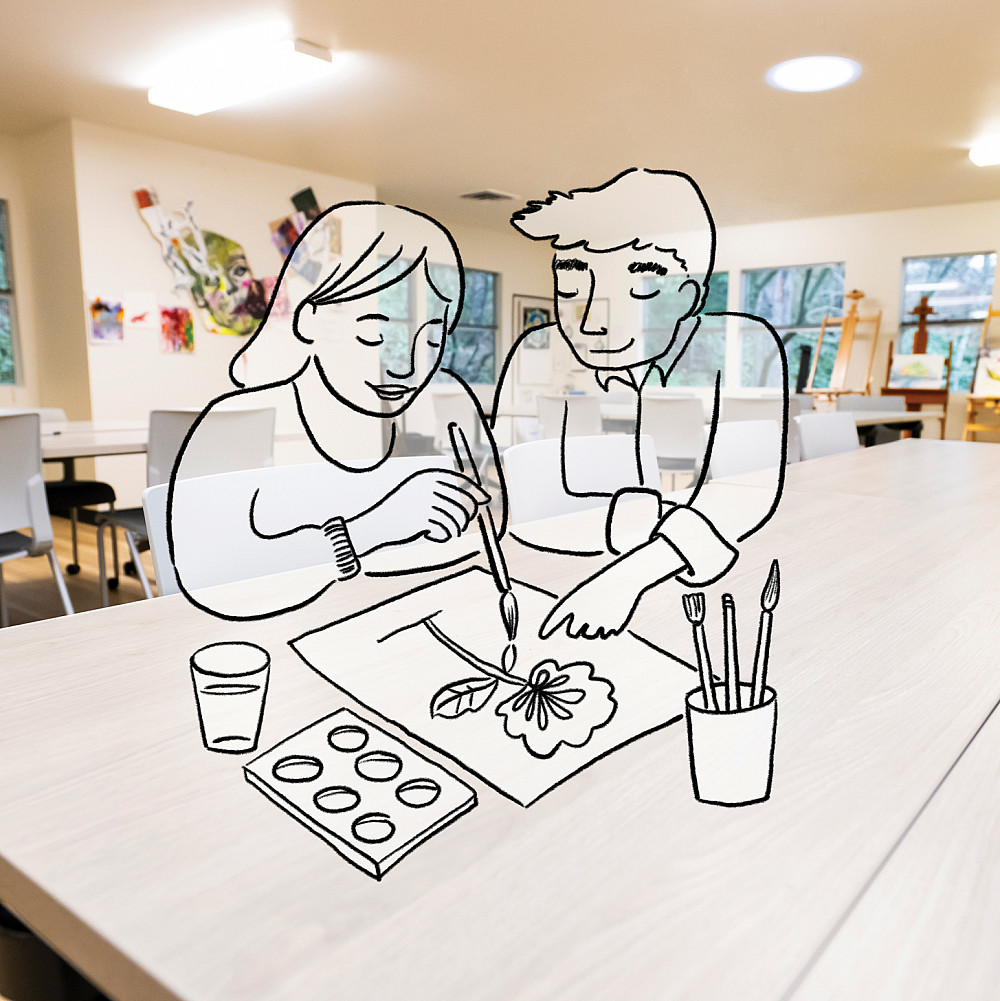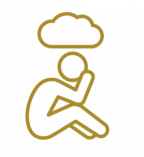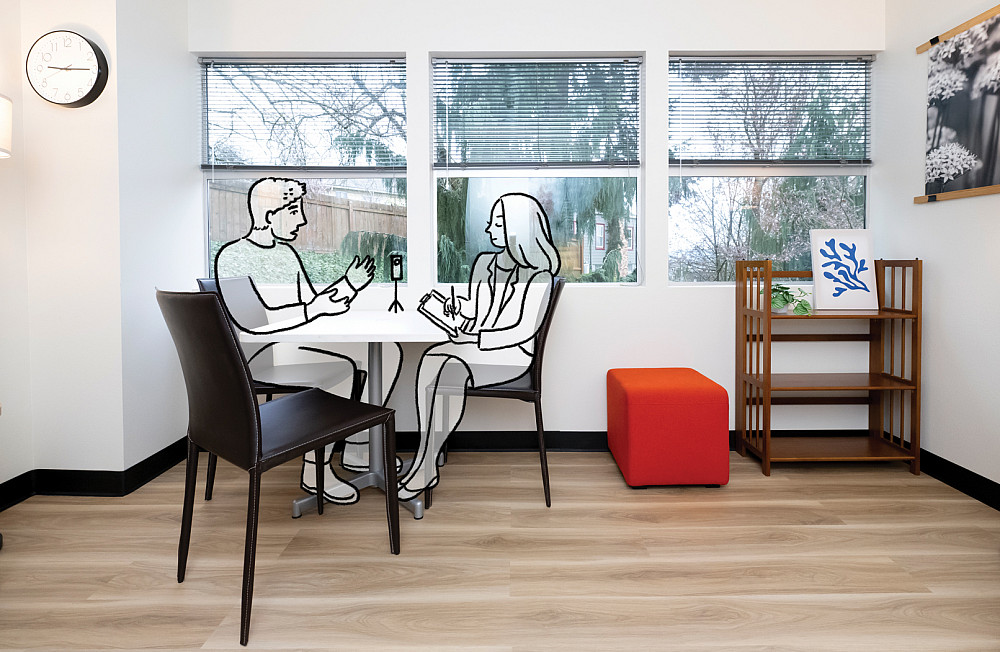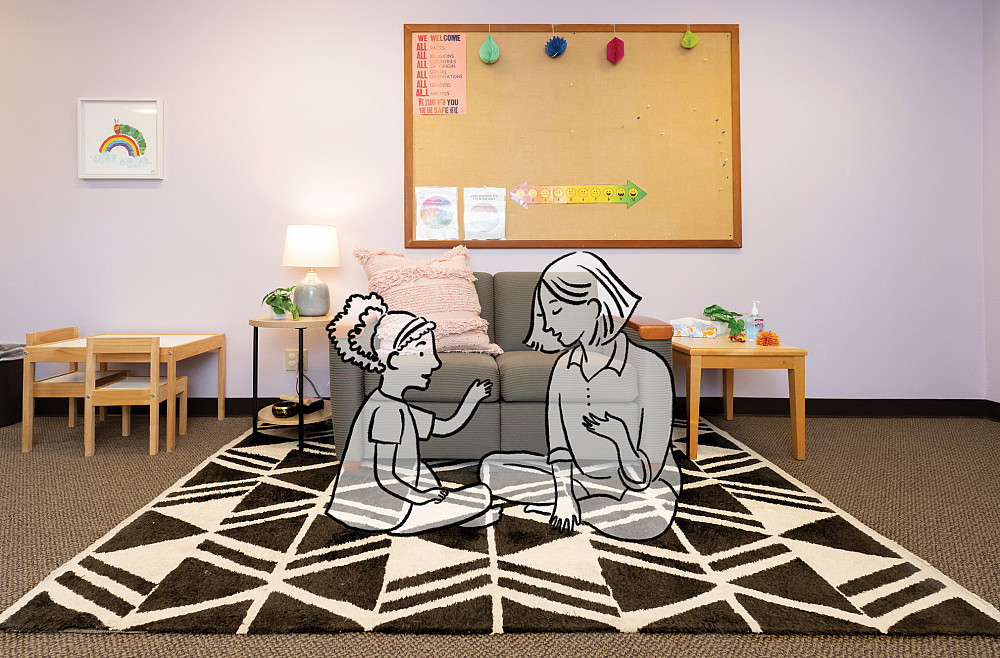main content A Growing Hub for Mental Health
Lewis & Clark’s newly expanded Community Counseling Center serves as a training ground for counseling students and a thriving mental health resource for Portland.

By Romel Hernandez
Photographs by Nina Johnson
Illustrations by Mariko Jesse
Hannah Gordon MA ’24 traces her desire to become a mental health counselor to her preteen years, when she was striving to navigate the treacherous waters of middle school.
“I had a middle school counselor who was really there for me,” she says. “Through it all—getting into trouble, coping with school pressure, dealing with bullying—my counselor always believed in me, supported me, and encouraged me to keep trying. I wouldn’t be here today if it wasn’t for her. I want to pay it forward.”
Gordon fulfilled her childhood dream when she got to meet her first clients at Lewis & Clark’s Community Counseling Center, part of the Graduate School of Education and Counseling. A third-year master’s student in L&C’s professional mental health counseling program, she worked two semesters at the center as part of the practicum for her degree.
Even though she had worked toward that moment for so many years, seeing counseling clients at the center for the first time was daunting. “At first, it was surreal to make the transition from student mode to professional mode,” she says. “It’s a big responsibility to actually meet the people coming to you for help—people counting on you.”
For the past 12 years, the Community Counseling Center has been a vital part of the graduate school’s Department of Counseling, Therapy, and School Psychology. The center recently underwent a major expansion and renovation. Additional treatment rooms and classrooms—as well as a new studio and gallery for art therapy—provide students, faculty and, of course, clients with a positive, calming environment.
“We want to put Lewis & Clark’s counseling center on the map in this community,” says Nori Valdez Gruber, the center’s director, herself a 2011 graduate of L&C’s counseling program. “We’re earning a strong reputation for providing excellent care in multiple mental health disciplines. We are considered a one-stop shop for different therapy options.”
A Teaching Clinic
for Mental Health
Located four miles from campus on Barbur Boulevard in Southwest Portland, Lewis & Clark’s Community Counseling Center serves as the clinical hub for graduate students in counseling during their third and final year of study. The graduate school offers programs in marriage, couple, and family therapy; professional mental health counseling; professional mental health counseling with specialization in addiction; and art therapy. The center’s expansion was made possible through institutional funds, an anonymous donation, and support from the building’s owner, the Confederated Tribes of Grand Ronde.
Each semester, up to 100 graduate students gain firsthand clinical experience at the center by completing practicums under the close supervision of core faculty. The students enrolled in L&C’s counseling programs spend their first two years focusing on academic work before gaining hands-on training during their third year. Depending on the program, practicum students spend two to three consecutive semesters seeing clients at the center before expanding their reach to include internships in clinics and community nonprofits.
These are trying times everywhere. There are so many people trying to get affordable, accessible help—we’re doing what we can to get clients in the door as quickly as possible.”
Nori Valdez Gruber MA ’11,
Director of the Community Counseling Center
Organized into cohorts of up to six grad students each, the groups meet weekly for discussion both before and after their client appointments. Each cohort spends a day at the center, including a four-hour block of seeing clients. The 50-minute counseling sessions take place over a teleconferencing app or in person, with faculty supervisors observing the interactions through a live video feed transmitted to another room.
The real-time monitoring, as well as recorded video playback sessions, allows faculty supervisors to offer specific, individualized assessment on the counseling sessions—what went well and what needs improvement. That in-depth feedback—pointing out patterns in client interactions, suggesting alternative approaches—helps grad students get the most out of the sessions and develop their skills as practitioners.
“The practicum was by far the most rewarding part of my experience at Lewis & Clark,” says Gordon. “My supervisor [Jessica Ferrante MA ’19, an adjunct professor and private practitioner] was amazing—she was so supportive and so kind every step of the way. Also, my clients were the most wonderful people. I learned as much from them as I hope they learned from me.”
Meeting the ‘Tsunami’
of Mental Health Needs
Lewis & Clark’s Community Counseling Center is more than a student training ground. As the center has grown, it has established itself as a critical community resource in a time when the need for mental health counseling is more acute than ever. The number of adults and children seeking mental health services is rising sharply nationwide, according to the Centers for Disease Control and Prevention. The COVID-19 pandemic exacerbated what experts have characterized as a mental health “tsunami,” which continues to be felt today. The current supply of skilled practitioners can’t keep up with the increasing demand for services.
When the Community Counseling Center first opened in 2012, it started out with about 35 clients. Today, approximately 600 people receive counseling services at the center each year, with a two- to three-month waiting list for new clients. The center has undergone two expansions of its space over that time, reaching a total of over 12,000 square feet, a more than fourfold increase since its inception.
The increase in space is meant to address the increase in need. “These are trying times everywhere,” director Gruber says. “There are so many people trying to get affordable, accessible help—we’re doing what we can to get clients in the door as quickly as possible.”
Potential clients find the center mainly through advertisements and word of mouth. Adults and children come to seek help with a wide range of issues, such as depression, grief, or anxiety. Individuals suffering with more severe mental illnesses or serious medical issues are referred to outside providers for treatment. The center’s counseling clients can choose between telehealth or in-person appointments that typically occur weekly. (About three-quarters of the sessions are conducted via a secure video link with Zoom.)
-
THE NEED FOR MENTAL HEALTH CARE
Adults reporting
symptoms
of anxiety and/or
depressive disorders
(2023)
United States: 32.3%
Oregon: 35.3%
Washington: 32.6%
Unmet need for
counseling or therapy
among adults
reporting symptoms
of anxiety and/or
depressive disorders
(2022)
United States: 28.2%
Oregon: 32.3%
Washington: 34.4%Source: KFF (formerly the
Kaiser Family Foundation) -
PANDEMIC-ERA-STRESS
Percentage of U.S.
adults who reported
high levels of
psychological
distress
(spring 2020 to fall 2022)
41%
Percentage of high schoolers
who felt sad or hopeless
every day for two or more weeks in a row such
that they stopped doing
usual activities
(at some point during 2021)
United States: 44%
U.S./straight: 37%
U.S./gay, lesbian, bisexual: 76%
U.S./other or questioning: 69%Source: “America’s Age of Anxiety,”
The Pew Charitable Trusts, 2023.
With the majority of its clients lacking health insurance or living on limited income, the center charges on a sliding scale based on what clients can afford—typically between $10 and $70 per appointment. A counselor in private practice typically changes anywhere from $100 to more than $200 per session.
“The center is a unique place that is continuing to grow in order to meet the need,” says Cort Dorn-Medeiros MS ’09, associate professor and department chair of Counseling, Therapy, and School Psychology. “This expansion impacts our capacity to provide training for our students, to serve more clients, and to engage the community.”

A New Home for
Art Therapy Program
The center’s expansion also means the Art Therapy Program can move into the building. In the past, art therapy students would meet clients on campus or other locations in the metro area. Now four of the treatment rooms will be equipped for art therapy, with a healthy stock of drawing materials, paints, clay, and other art-making supplies. The art gallery is already displaying artwork made by current grad students as part of their capstone projects.
In keeping with the therapy’s mission of employing art to promote mental health and healing, the center’s art studio also is offering a public drop-in time on Thursday afternoons. Facilitated by faculty and grad students, the open time allows community members to come out and explore their creativity in a variety of ways.
“The new space is really a blank canvas—I expect it to evolve over time,” says Mary Andrus, assistant professor and director of L&C’s Art Therapy Program. “Having a community studio that’s actually based in the community gives us the potential for some really innovative and exciting new collaborations.”
TransActive Gender
Project Collaboration
Over the years, the Graduate School of Education and Counseling has deepened its mission related to social justice, equity, and access. The center plays a major role in that effort through its outreach to communities of color and other marginalized groups struggling to access culturally competent mental health support.
Lewis & Clark’s work in that area has been recognized by the Oregon Health Authority, which has awarded the graduate school $2.5 million in state grants over the past two years to help diversify the states’s behavioral health workforce. The funds are earmarked for scholarships for grad students enrolled in L&C’s counseling programs. The state reaps long-term benefits because a majority of the program’s students stay in the area to practice after graduation, according to Dorn-Medeiros.
The stakes are high because of the growing rates of depression and suicide among young people. On top of that, trans youth often struggle with added stresses related to coming out and gender transition.
The center’s new pilot program in collaboration with the college’s TransActive Gender Project epitomizes that wider social commitment. As of fall 2023, one of the practicum cohorts is dedicated to working exclusively with transgender and gender-diverse youth and their families. The counseling students have received specialized training to serve their clients, who range in age from 8 to 18.
“What we’re doing is distinctive,” says Rafe McCullough, the associate professor supervising that cohort. “The students get specialized, trans-competent training on the clinical implications of things like the broader political and social climate and how that can make kids feel unaccepted and unsafe.”
The initiative is designed to work not only with children, but also with parents and caregivers. McCullough notes, “You’re an advocate for the kids, but it’s important to meet families wherever they’re at, too.”

The stakes are high because of the growing rates of depression and suicide among young people. On top of that, trans youth often struggle with added stresses related to coming out and gender transition.
Alex Bassi MA ’24, one of the student-counselors working with trans youth, says they feel “a sense of urgency” in their work and credits faculty and fellow students for their guidance and encouragement.
“It can be really intimidating to start meeting directly with clients for the first time,” Bassi says. “But knowing you’ve got such a strong support system of professors and peers makes a huge difference.”
After graduating, Bassi, who identifies as a nonbinary person of color, plans to apply their education and training to serve BIPOC and queer/trans people, especially those with intersecting identities. “It’s important to offer everyone a safe, healing space—even if it’s only during a 50-minute counseling session. It’s a start.”
To inquire about services at the Community Counseling Center, prospective clients can confidentially submit an electronic intake form at graduate.lclark.edu/clinics/community_counseling/resources.
More L&C Magazine Stories
L&C Magazine is located in McAfee on the Undergraduate Campus.
MSC: 19
email magazine@lclark.edu
voice 503-768-7970
fax 503-768-7969
The L&C Magazine staff welcomes letters and emails from readers about topics covered in the magazine. Correspondence must include your name and location and may be edited.
L&C Magazine
Lewis & Clark
615 S. Palatine Hill Road
Portland OR 97219

